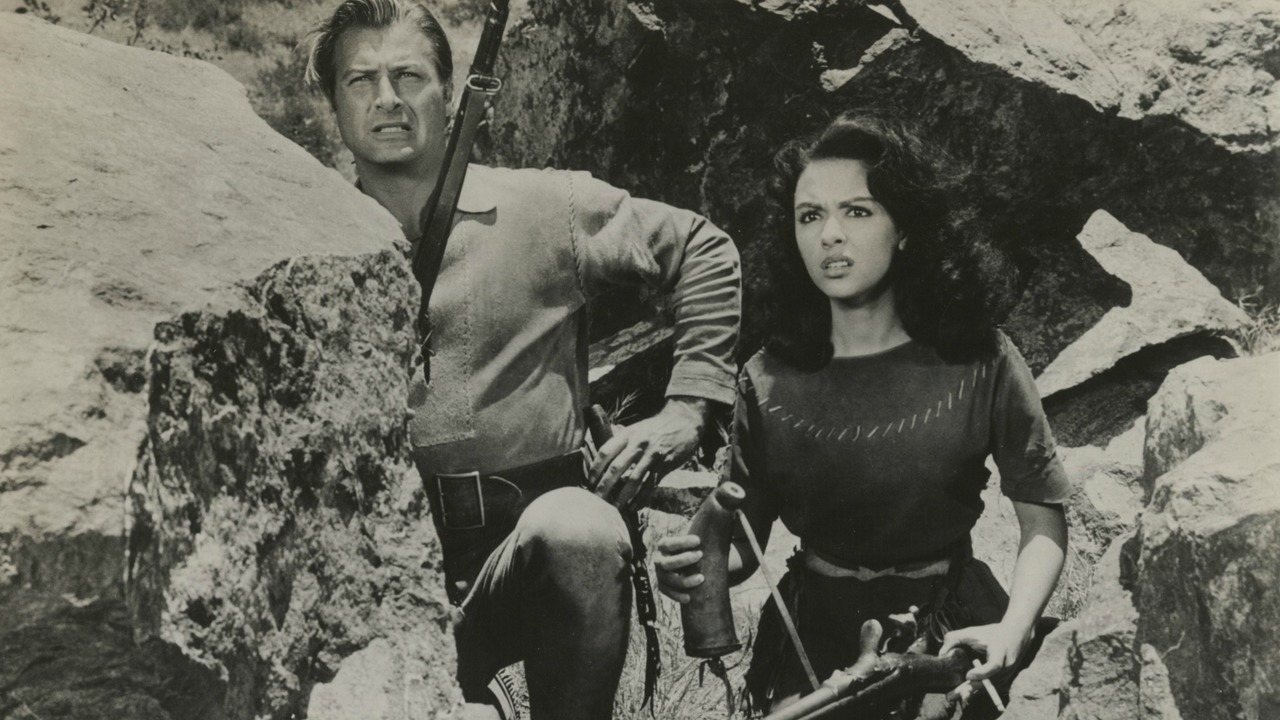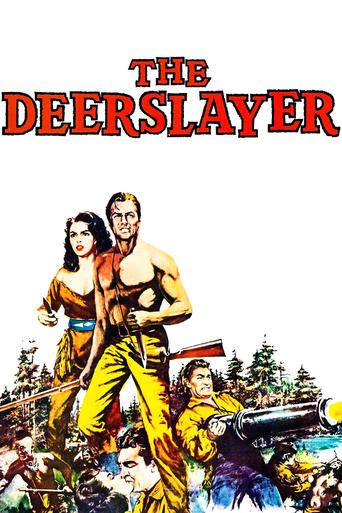Blucher
One of the worst movies I've ever seen
Curapedi
I cannot think of one single thing that I would change about this film. The acting is incomparable, the directing deft, and the writing poignantly brilliant.
InformationRap
This is one of the few movies I've ever seen where the whole audience broke into spontaneous, loud applause a third of the way in.
Arianna Moses
Let me be very fair here, this is not the best movie in my opinion. But, this movie is fun, it has purpose and is very enjoyable to watch.
JohnHowardReid
Copyright 1957 by 20th Century-Fox Film Corp. No New York opening. U.S. release: September 1957. U.K. release: 8 December 1957. Australian release: 26 December 1957. Sydney opening at the Palace. 6,868 feet. 76 minutes.SYNOPSIS : Leather-Stocking and his Mohican blood-brother become involved in an embittered settler's one-man war against the Huron Indians.NOTES: Cooper's novel was previously filmed in 1923 and again in 1943.Fox's 86th CinemaScope feature and the first from the home office that failed to secure a New York opening. Fox's U.K. office were so ashamed of this low-budget offering that they managed to successfully pass it off as a Regal Film.COMMENT: Disappointing. True, Neumann can use the CinemaScope screen effectively at times, but his good intentions are undermined both by his over-talkative script with its often unintentionally risible lines and by his roster of distinctly second-string players. True, all the players have proved themselves capable of much better things, but oddly enough the only person to give a halfway decent performance here is Forrest Tucker, the runt of the acting litter. Despite a fair amount of location lensing, Neumann's minuscule budget imposes such production limitations that most viewers are likely to be bored stiff. Neumann has tried to spark up interest by accenting violence and brutality but this stratagem only further lessens this Deerslayer's already rather limited appeal.
Equinox23
Judging from other reviews this must be a quite racist movie, when in fact it isn't.First of all the Native Americans, here represented by the Hurons, do not carry the main conflict. In fact they are quite civilized, for they agree to let their sworn enemy, Hutter, go free in return for the scalps of the people Hutter has killed.The actual conflicting parties are Old Hutter and Harry March on the one side and mainly Deerslayer and Chingachook on the other. The main mystery for Deerslayer to solve - and it is no McGuffin - is why the Hurons are attacking and it really is something despicable and dark: Old Hutter has been hunting for Native Americans and with the help of Harry March been selling their scalps. Old Hutter does it to revenge his wife and March is in it for the money, which in fact will bring Deerslayer and Chingachook in pretty bad trouble. Something that Deerslayer decidedly is horrified by. Even though one might argue about the happy ending, it is the movie's merit to explicitly show this horrible practice of putting a price on Native Americans' scalps.
Ty Shadow
"The Deerslayer," much like the novel that came before it, is perhaps one of many politically INcorrect movies in America. Sure, the guy who wrote the book lived 150 years ago, but he had an excuse; he and the rest of the settlers were probably so busy trying to survive in unknown territory that they could afford to be completely ignorant of the fact that the Native Americans were people just like him. Civil Rights were the LEAST of their problems.The people who made this horrible movie, however, have absolutely NO excuse for the crude, offensive portrayal of Native Americans. It seemed at first that they were *trying* to be politically correct (or PC, as I usually abbreviate it), but it sank to using terms like "savages" and kept the focus entirely on the white characters and the "good Indian."Speaking of Indians, here's one of the many ***SPOILERS*** I warned you about; Hetty Hutter (played by the brilliant Rita Moreno) is NOT Judith's sister - Hetty is actually an Indian that the old guy took from a camp he would later set fire to (she was just a baby when this happened). I have two MAJOR problems with this. First of all, if the old guy hates Indians so much, WHY WOULD HE BOTHER TO TAKE ONE OF THEIR BABIES??? The movie says it's because he thought he could raise her to be "normal," and not like one of her "savage race," and by now we all should know that this is SO RACIST. At best, this establishes the old guy as a villain (though not THE villain). I found myself wanting him to die and I loathed the main character for wanting to save him, but the old guy's final death took so darn long, I couldn't enjoy it. Second, prior to the discovery of Hetty's true heritage, everyone thought she was just stupid (or crazy). The idiot screen-hog who plays Deerslayer tries to comfort her (she's *saddened* by this discovery) by making up some gibberish about Indians having some sort of 6th sense that's unique to their genes and that it's okay if she wasn't "one of us." I don't remember the exact wording - it came off sounding completely racist (more so than the old guy), and when I tried to think about it, the characters had moved on to the next problem.And, not surprisingly, this movie's also UNBELIEVABLY SEXIST! Rita Moreno constantly looks like she wants to get in on some of the action, but the white male screen-hogs are the ones who get to do the fight-scenes. All Hetty gets to do action-wise is dive into a lake and carry a knife in the hopes of rescuing Judith - but Hetty gets captured, as all female leads before 1973 did. Poor Rita. I had hoped her character would get to be one of the heroes, too - but it turns out that all Hetty was there for was to;1) look odd (or "exotic," as I've heard her be described),2) add to the pathetic drama,and3) make Deerslayer LOOK like he's all for equal opportunity (when he's really just like the old racist guy).Rita Moreno, one of my favorite actresses, persevered through a movie that both degraded and exploited her. I have to give her 8 stars for her bravery. However, as a staunch supporter of Civil rights, I cannot - in good conscience - give "The Deerslayer" more than one star.
Gary Dickerson
I've always shared Mark Twain's views on James Fenimore Cooper's writing & would much rather see a decent movie version of any Natty Bumpo story than having to wade through the ponderous verse, & tuned into American Movie Classics tonight to see one of the many movie versions out there about The Deerslayer. Made in 1957, this cut-rate production starring Lex Barker (who played Tarzan a few times before this), Rita Moreno (whom I have never seen this young) & Forrest Tucker (whom I like much better on "F Troop") comes across as something only marginally as good as something you might have seen produced by "The Wonderful World Of Disney." Or maybe by Sid & Marty Krofft, to be seen as the live-action segments on "The Banana Splits."Deerslayer & his faithful Indian companion Chingachgook stumble onto an old trader (Tucker) who asks for their help in protecting a crazy old man & his two daughters from a Huron assault. Well-groomed & stoic throughout, Deerslayer agrees (for some reason) & meets the old man on his floating fort in the middle of the river. The crazy codger hates Indians, & he seems to pamper & flatter his oldest daughter while telling his youngest (played by Moreno) that she's feeble-minded. Deerslayer has suspicions about the whole set-up, but you don't have to be an avid mystery-novel reader to figure out the reasons behind the Huron charge. Barker, constantly posing with his gun & giving those humored looks at the women that George Reeves as Superman always did, plays an android Deerslayer, & the fight scenes are about as exciting as the cliched "Yi yi yi" the Huron holler out when attacking is threatening.I guess this was made for the Saturday-morning-movie crowd, but there's a part of me that can't believe that even children of the 1950s would be taken in by what now seems obvious: the ridiculously stereotyped Indians, the bad, off-the-screen violence poorly done, even the wooden performance by Barker must've been seen as more comic than heroic. Daniel Day-Lewis frantically saying, "Don't worry, I'll find you!" never looked better.

